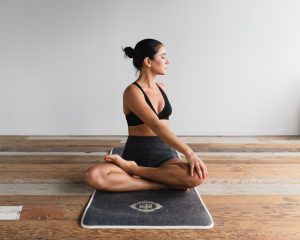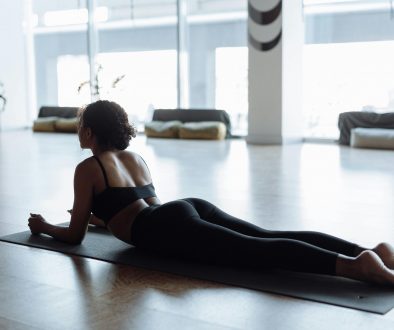How to improve your mood
5 Tips from our Chiropractors
Low mood, stress and anxiety – unfortunately, 1 in 6 people report suffering with poor mental health every week, according to the mental health charity, Mind. Low mood is horrible, it saps your energy and zest for life and can leave you feeling numb, hopeless, and potentially suffering with depression. However, there is some good news for your mental health:
The mind is a powerful tool and if harnessed correctly and guided with the right support, our minds can be reprogrammed to keep us in a balanced, resilient and positive mindset.
So hold onto that hope as we, at Skelian, walk you through some of our health tips to improve your mood. Some of the tips we give below are quick fixes to improve your mood immediately, but we have also included some healthy habits that require discipline and practice but will safeguard your mental health for the future. Much like physical rehabilitation exercises and going to the gym for your musculoskeletal health, these tips are best when practised with consistency. You may have already read our blog on mental health during the pandemic, if not, you can read it here.
1.) Move Your Body: The Mind-Body Connection

Find a way to exercise and move your body that feels good for you, maybe it’s getting “the pump” after lifting weights at the gym or bouldering at the local climbing wall. Perhaps, it’s feeling the burn as you work your core in pilates or maybe it’s feeling that stretch and release as you do some Hatha yoga. For me, it’s feeling my heart and lungs work hard after walking up a hill and taking in the view as I catch my breath. Check out our favourite Cheltenham dog walks here.
Often when we are suffering from low mood, our minds are filled with anxious or catastrophising (imagining the worst) thoughts. It can be utterly overwhelming and consume all of your energy. When was the last time you had a still mind and felt at peace? One way to achieve a calm mind is to find the mind-body connection. This means focusing your mind on the body as you perform a movement. It’s one of the best ways to get the most out of your workouts too.
A simple example of what happens when you don’t connect the mind to the body: take standing on one leg. If you stand on one leg and mentally make a list of all the chores you need to get done today, you aren’t engaging the muscles sufficiently to make this exercise worthwhile and most likely you will fall over. However, if you take a deep breath, activate your core, your glutes, press down evenly into your heel and toes and focus your mind on engaging those muscles and feeling them work, your mind is too busy and doesn’t have room to think of all those negative thoughts that bring you down.

The same can be said for performing a deadlift in the gym. Without connecting the mind to your body, sure you can perform the exercise, but did you consciously engage your shoulder muscles or activate your core to lift correctly and protect your lower back? The mind-body connection is so brilliant because it is so simple. The mind can only really focus on one thing at a time, so moving your body and being aware of which muscles you are engaging, allows your brain to have a break from the busy thoughts and gives you 30 minutes of peace.
If you are also suffering from aches and pains, you can speak to one of our chiropractors, our sports therapist or our specialist physiotherapist for tailor-made exercises that could reduce your pain and help you find movement again.
2.) Get Outside In Nature & Practise Mindfulness
Come rain or shine, there are so many benefits to being outside in nature. Make sure you have all the right equipment: a waterproof coat (or sunscreen depending on the time of year), walking boots, a bottle of water and snacks (if you get hangry like me) to ensure you can make the most of the outdoors.
Now you are equipped for the elements, nature really is the best place to practise Mindfulness. You might already be practising Mindfulness but didn’t realise it! Mindfulness is the art of being present in this very moment. That means, letting your thoughts pass by and letting go of them. Instead of dwelling on negative thoughts, you are able to acknowledge them but let them go.

In Mindfulness, you focus on being present, and becoming aware of your surroundings through your senses. This does take practice, especially in our hectic, productivity-focused, schedule-intensive lives but all the more reason to give it a go. It can also feel a little alien to let go of social norms and embrace nature, so persevere with it and leave any feelings of self-consciousness behind. Don’t knock it ’til you try it.
Find yourself a quiet spot in nature. Stop. Feel the rain or the warmth of the sun on your skin. Hear the squelch of the mud or breathe in the baked earth smell of summer. Smile into the showers. Lift your arms up and holla! Or perhaps sit still and listen to the birds and rustle of leaves as the squirrels race up and down the branches. Inhale the earthy smell of the fields or freshly mown grass in the park. Touch the thick, twisted bark of the trees and ivy vines, or run your hand over the damp moss. If you’re not sure how to act in nature, think of toddlers exploring the world, use your senses to guide you, not your thoughts. Let your body take over and give your mind a break.

If you’re still not convinced, just look at the many studies conducted on the Japanese art of forest-bathing or shinrin-yoku. While researching this topic, I came across an article from the American Psychological Association that summarises the conclusions of a wide range of scientific studies on the benefits of nature which include:
- Reduced levels of stress and anxiety
- Improved cognition and memory
- Better mood self-regulation
- Lower likelihood of mood disorders
- Improved cooperation and patience
Alison Pritchard, PhD, ABPP, at the University of Derby in England, and colleagues found that people who feel more connected to nature have greater eudaimonic well-being—a type of contentment that goes beyond just feeling good and includes having meaningful purpose in life (Journal of Happiness Studies, online first publication, 2019).
That sounds great but what if you have a busy day at work or the kids are sick and you just can’t get out of the house? Not to worry, images and sounds of the forest or ocean have been shown to have many of the same benefits. It’s not quite as good as the real deal but if you’re not able to get outside, put on some nature sounds and relax.
3.) Do Good Deeds
When we suffer from low mood, we sometimes push people away or feel we have no purpose. We may even have negative thoughts that we are “not good enough”. Here’s how helping someone can redirect your brain to more positive thoughts.
As humans, cooperation and connection has been at the centre of our survival as a species, it is part of our DNA. Helping others gives us a sense of reward, it also shifts the focus from inward-looking (me, my life, my worries) to outward-looking, hopefulness and connection with others.

There are a few things to be mindful of. Perhaps you have heard of the “oxygen mask” analogy? You should put your own oxygen mask on before helping others. So if you are not in a good place to help others, seek help for yourself first and safeguard your own energy. Be clear with boundaries, only give as much time and energy as you want and know that you can say no at any point. If you still want to help, here are a couple of options:
a.) Help via a community or charity
This way, you will find like-minded folk, a friendly community and you can dip in and out. One example of this is the Green Gym where you can make a difference to your local area through gardening or conservation work with other volunteers.
Just 8 weeks of participation in TCV’s Green Gym showed clear enhancements in the cortisol awakening response which is beneficial for health and well-being. Participants also reported marked reductions in anxiety as well as reduced feeling of stress. This study looked at mental health, however, the physical activity and social nature of Green Gym is likely to have many other health benefits that warrant further research.
Professor Angela Clow, University of Westminster
b.) Try nurturing a plant or garden instead. Perhaps it’s a houseplant like Monstera Deliciosa or maybe you are growing a plant from seed. Tending to a plant teaches patience and perseverance, especially if you are growing a vegetable garden. Nurturing a plant can feel hopeful, “will it flower soon?” and teaches you to trust the process. It can aid in reminding you to question, “What do I need, are my basic needs being met?”. Not to mention the exposure to nature and its benefits as stated earlier in this blog. Check out our blog on the best plants to grow and gardens to visit.

“To plant a garden is to believe in tomorrow.” Audrey Hepburn
If you would like to join a gardening community in Cheltenham, click here.
4.) Connect with people who give you energy and validation
First of all, you need to find your tribe, people you can authentically be yourself with. We’re talking, vulnerable, honest, you can show the good, the bad, and the ugly with no judgment. Maybe it’s your oldest friend, or maybe it’s someone you met recently in spin class or on the football team but you feel like you have known them forever. The hardest part is finding your tribe, once you have them in your life, you’ll feel heard, understood, and validated and they will keep you grounded. A sense that you belong and you have found your place. If you ever feel lost, your “tribe” will help you find your path with kindness.
5.) Be playful: Find Joy
We have talked about movement to give your mind a moment’s peace but movement can also be a way to bring joy back into our lives. Often when someone is under a lot of stress or feeling overwhelmed, they just do not have the headspace for joy. Everything feels serious. You might even feel like you can’t allow yourself to have fun until the stressful event has been resolved. We’re here to tell you that, you have permission to feel joy even in the midst of a difficult time. We can feel two conflicting emotions at once. It is often the human way of dealing with difficult events. So take this moment to find joy in a healthy way and we have just the ticket …
There is one movement that might just take the gold medal in the mood-boosting Olympics and that is dancing. I’m not talking Strictly Come Dancing perfection, I’m talking dancing around the kitchen like a goofball in your pajamas listening to that one song that you can’t help but move your body to. If you’re feeling embarrassed, don’t be, we all do it, let go of being a serious adult and be playful for 5 minutes and see how you feel. Maybe just start with shaking out your whole body and doing a shoulder shimmy, I guarantee you’ll be shaking your body to the beat in no time.

On a more serious note, dancing has long been used as a means to release emotion, trauma and express what we can’t express with words. The Zar dance from Eygpt for example has been used since ancient times for healing and in Western medicine, Carl Jung used dance therapy as part of his toolkit in psychotherapy. So if you find a good emotional release from dance, then that is also a great way to ease the burden that you might be carrying.
Want to feel part of a community? Joy in Dance is run by Grace, she provides short, fun (absolutely no skill required) free dance tutorials on Facebook so you can watch them and join in at your own leisure, otherwise there are many beginner-friendly classes in Cheltenham, just a Google search away.
At Skelian, we take mental health very seriously, it is well known that people suffering from chronic illness or pain are likely to suffer from low mood. As musculoskeletal experts, our practitioners see a lot of new patients in pain, some of whom have been in pain for many years but didn’t know where to turn until they came to see one of our team of chiropractors, our sports therapist and specialist physiotherapist. While our team at Skelian can help with your musculoskeletal pain, there are times, when professional help from a mental health provider is also needed.
When And Where To Get Help
When is always now. Never hesitate to get help. No matter how big or how small your concerns are, speak to someone, that may be a trusted friend, or better yet a mental health professional. Low mood and depression should never be ignored. You wouldn’t do that for a broken leg, so seek professional help and know that you have made the first positive step.
Here are some useful contact details if you are feeling low.
- Samaritans – a free call 116 123 (24 hours a day, 365 days a year) or email jo@samaritans.org
- SANEline 0300 304 7000 (4.30pm–10.30pm every day).
- National Suicide Prevention Helpline UK. Offers a supportive listening service to anyone with thoughts of suicide. You can call the National Suicide Prevention Helpline UK on 0800 689 5652 (6pm–3:30am every day).
- Campaign Against Living Miserably (CALM). You can call the CALM on 0800 58 58 58 (5pm–midnight every day) if you are struggling and need to talk. Or if you prefer not to speak on the phone, you could try the CALM webchat service.
- Shout. If you would prefer not to talk but want some mental health support, you could text SHOUT to 85258. Shout offers a confidential 24/7 text service providing support if you are in crisis and need immediate help.
- The Mix. If you’re under 25, you can call The Mix on 0808 808 4994 (3pm–midnight every day), request support by email using this form on The Mix website or use their crisis text messenger service.
- Papyrus HOPELINEUK. If you’re under 35 and struggling with suicidal feelings, or concerned about a young person who might be struggling, you can call Papyrus HOPELINEUK on 0800 068 4141 (weekdays 10am-10pm, weekends 2pm-10pm and bank holidays 2pm–10pm), email pat@papyrus-uk.org or text 07786 209 697.
- Switchboard. If you identify as gay, lesbian, bisexual or transgender, you can call Switchboard on 0300 330 0630 (10am–10pm every day), email chris@switchboard.lgbt or use their webchat service. Phone operators all identify as LGBT+.
- You may find the Mental Health Matters website useful





